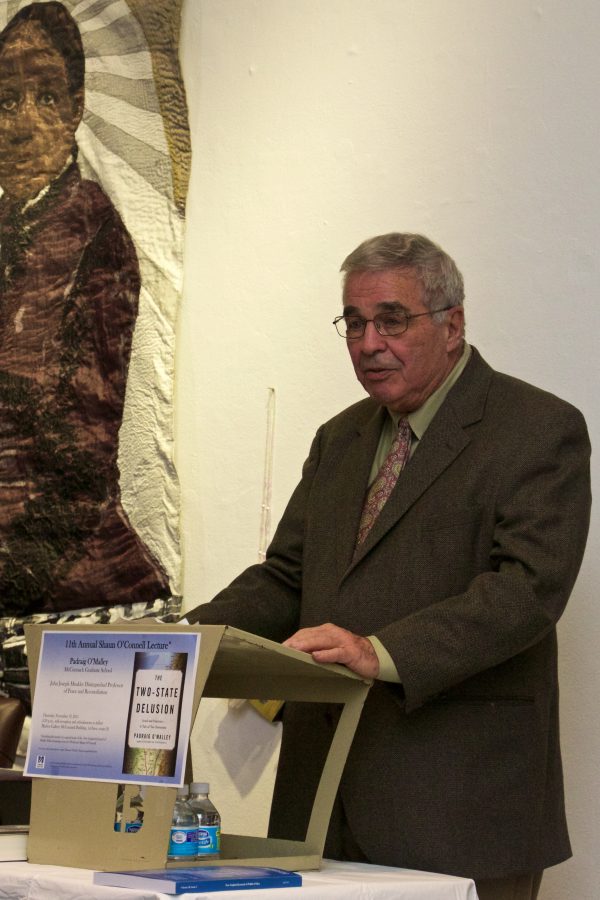On November 19, author and Distinguished Professor of Peace and Reconciliation Padraig O’Malley was the honored guest and speaker at the 11th Annual Shaun O’Connell Lecture Series at the University of Massachusetts Boston. The event also presented a special issue of the New England Journal Of Public Policy that featured essays by O’Connell who initiated this lecture series. He is one of the “founding fathers” of UMass Boston and one of the few remaining original professors of the university as the Department Chair of English, Cheryl Nixon pointed out. This November, O’Connell celebrated his 50 years of service at the university. In 2005, the lecture series was launched to honor his then 40 years of service. Nixon also added that this lecture is supposed to have a more reflective intention and motivate us to “rethink pressing issues of today.” Furthermore, Thomas O’Grady, who is also an English Professor at UMass Boston, welcomed the retired faculty that attended this event. O’Grady explained that this lecture series always brings intellectuals together.
However, this annual lecture did not only focus on its name bearer, O’Connell, but also put the spotlight on its guest speaker, Padraig O’Malley, who presented his new book, “The Two-State Delusion,” which addresses the past, present and future of Israel and Palestine. O’Connell praised O’Malley’s work as peacemaker and in international negotiations. Over many years, O’Malley has helped cultures in conflict, contributed to agreements and “written brilliantly on cultures in conflict.” “And now he has written about Israel and Palestine,” he added about the author, whom he supposedly met at a pub in South Boston.
O’Malley introduced his new book by explaining that there are multiple reasons for why it has not been feasible to reach an agreement between Israel and Palestine and establish a two-state solution. He recalled that one problem is that Palestine was never consulted when the Israelis established their state in 1948. In the process of claiming this land and the ensuing war, 750,000 Palestinians were pushed out or fled the country, of which most were denied re-entry. Nowadays, O’Malley explained, the majority of Orthodox Jews want to deport Palestinians to the Westbank. The reason for that is that in their narrative, Jewish people feel that this land is their birthright and their divine soil. Thus, this land is promised to them and Palestinians are seen as occupiers. In contrast, the Palestinians argue that their people have been there longer and thus hold the right to live freely. “Israel is asking Palestinians to give up their narrative and right.” Furthermore, another big intercultural obstacle here is that for both peoples, part of their identity are their losses of the past. For the Jews it is the Holocaust, but for the Palestinians it is their forced exodus. The author explained that “when you constantly remember a loss, you cannot get over it,” which influences the decisions that people make.
In 1940, it was the first time that a plan for dividing the country up into two nations was drawn up, and “every negotiation since then has factored around this two-state solution, and every one has failed.” According to O’Malley, it was often claimed that officials came close to an agreement, but in actuality “nothing is agreed until everything is accepted.” This shows that smaller and individual agreements do not have a strong significance in the big picture. Furthermore, a two-state solution could not be realized until now because there has been a lack of “systematic education” about what it actually takes, as well as an “absence of transformative leaders” who would be willing to understand each other. Additionally, the dominant presence of Hamas is often left out in negotiations, which prevents any successful agreement, as O’Malley points out.
If you are interested in reading Shaun O’Connell’s essays in the special issue of the New England Journal of Public Policy, go to http://scholarworks.umb.edu/nejpp/.
Padraig O’Malley’s book, “The Two-State Solution: Israel and Palestine – A Tale of Two Narratives,” is available for sale at bookstores and online retailers, averaging between $17 and $30.
Shaun O'Connell speaking at the event






















































